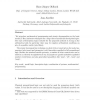275 search results - page 20 / 55 » Non-Termination Inference of Logic Programs |
108
click to vote
ASPLOS
2006
ACM
15 years 5 months ago
2006
ACM
Systems programs rely on fine-grain control of data representation and use of state to achieve performance, conformance to hardware specification, and temporal predictability. T...
SAS
2009
Springer
16 years 11 days ago
2009
Springer
In this paper we present a new shape analysis algorithm. The key distinguishing aspect of our algorithm is that it is completely compositional, bottom-up and non-iterative. We pres...
123
click to vote
CCS
2005
ACM
15 years 5 months ago
2005
ACM
The NRL Protocol Analyzer (NPA) is a tool for the formal specification and analysis of cryptographic protocols that has been used with great effect on a number of complex real-l...
104
click to vote
AI
1999
Springer
14 years 11 months ago
1999
Springer
Forthcoming in the Journal of Aritificial Intelligence We introduce mathematical programming and atomic decomposition as the basic modal (T-Box) inference techniques for a large c...
ICFP
2004
ACM
15 years 11 months ago
2004
ACM
Useful type inference must be faster than normalization. Otherwise, you could check safety conditions by running the program. We analyze the relationship between bounds on normali...

